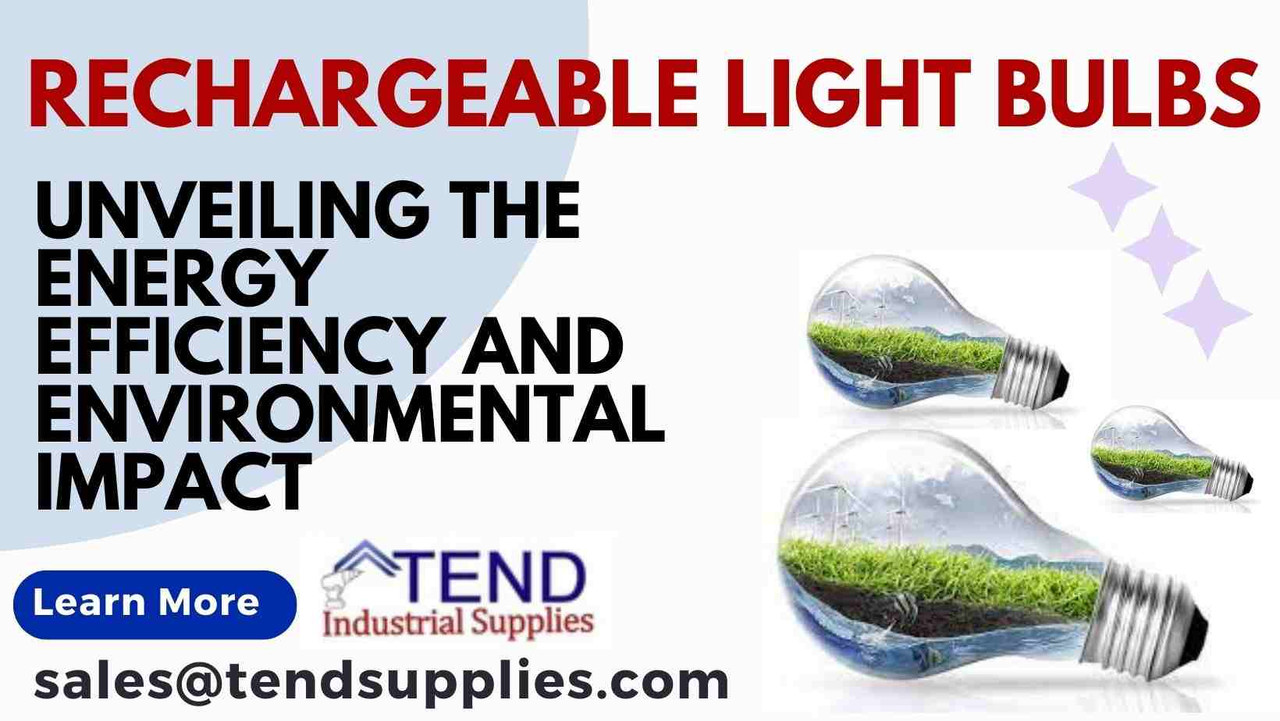Rechargeable Light Bulbs: Unveiling the Energy Efficiency and Environmental Impact
Rechargeable Light Bulbs Energy Efficiency and Environmental Impact
In this article, we will delve into the advantages and drawbacks of rechargeable light bulbs, specifically focusing on their energy efficiency and environmental impact. The advantages section will highlight the energy-saving properties of LED bulbs and their positive effects on reducing electricity bills and carbon emissions. Additionally, we will emphasize how rechargeable light bulbs align with sustainability efforts.
However, it is essential to consider the potential drawbacks associated with rechargeable light bulbs. We will discuss the environmental implications of their production processes, such as using raw materials and energy, and the challenges related to their disposal. Special attention will be given to the need for specialized recycling and proper waste management due to electronic components and potentially toxic substances.
To address these concerns, we will explore strategies for mitigating the environmental impact of rechargeable light bulbs. This includes advocating for sustainable manufacturing practices that utilize green technologies and renewable energy sources. Furthermore, we will discuss the importance of promoting responsible disposal through education on recycling programs and safe disposal methods.
Ultimately, by understanding the energy efficiency and environmental impact of rechargeable light bulbs, readers will be empowered to make informed decisions that balance their desire for efficient lighting solutions with environmental responsibility.
In today's environmentally conscious world, the importance of energy efficiency and reducing our carbon footprint cannot be overstated. Rechargeable, mainly LED bulbs, have emerged as a viable solution to meet these sustainability goals. In this article, we will explore the energy efficiency and environmental impact of rechargeable light bulbs, shedding light on their advantages and their positive contributions to our planet.
Advantages of Rechargeable Light Bulbs:
Rechargeable light bulbs, primarily LED bulbs, offer several notable advantages regarding energy efficiency. These benefits include::
Significant Energy Savings:
- Rechargeable light bulbs consume significantly less energy compared to traditional incandescent bulbs. LED bulbs, in particular, are highly efficient, converting a more significant portion of electrical energy into light and minimizing wasted energy as heat. This translates into lower electricity bills and reduced energy consumption.
Reduced Carbon Emissions:
- By using less energy, rechargeable light bulbs contribute to a decrease in carbon emissions. As electricity generation is a significant source of greenhouse gas emissions, rechargeable bulbs' energy efficiency helps mitigate climate change and preserve the environment for future generations.
Long Lifespan:
- Rechargeable light bulbs, such as LED bulbs, have an impressive lifespan compared to traditional bulbs. LED bulbs can last tens of thousands of hours, significantly longer than incandescent or fluorescent bulbs. This extended lifespan reduces the frequency of replacements, resulting in less waste and a lower environmental impact.
Environmental Impact of Rechargeable Light Bulbs:
While rechargeable light bulbs offer energy efficiency during their operation, it is important to consider their environmental impact beyond their usage. Factors to consider include:
Production Process:
- The manufacturing of rechargeable light bulbs requires raw materials and energy. The extraction, processing, and transportation of these materials may have environmental implications, including carbon emissions and resource depletion. It is crucial for manufacturers to adopt sustainable practices to minimize these impacts.
Disposal and Recycling:
- Rechargeable light bulbs contain electronic components and, in some cases, hazardous substances. Proper disposal and recycling are essential to prevent these materials from entering landfills and causing harm to the environment. Consumers should follow guidelines for recycling and ensure that rechargeable bulbs are disposed of responsibly.
Rechargeable light bulbs, particularly LED bulbs, offer significant energy efficiency benefits and contribute to reducing our environmental impact. They provide energy savings, reduce carbon emissions, and have a longer lifespan compared to traditional bulbs. However, it is crucial to consider the entire lifecycle of rechargeable bulbs, including their production and disposal, to fully understand their environmental impact. By embracing rechargeable light bulbs, we can make a positive difference in energy conservation and sustainable living, helping create a greener and more environmentally friendly future.
Rechargeable Light Bulbs: Balancing Environmental Impact and Sustainable Solutions
Rechargeable light bulbs, mainly LED bulbs, have gained popularity due to their energy efficiency and positive environmental impact. However, it is crucial to understand the drawbacks and challenges associated with these bulbs to make informed decisions. In this article, we will explore the environmental implications of production, the disposal challenges, and the measures taken to mitigate the ecological impact of rechargeable light bulbs.
Drawbacks of Rechargeable Light Bulbs:
Environmental Implications of Production:
- The production of rechargeable light bulbs involves raw materials and energy requirements. Extracting and processing these materials can have an environmental footprint, including carbon emissions and resource depletion. Manufacturers need to adopt sustainable manufacturing practices to minimize these impacts.
Disposal Challenges:
- Rechargeable light bulbs contain electronic components and may contain potentially toxic substances. Their disposal poses challenges that require specialized recycling processes to extract valuable materials and safely handle hazardous components. Proper waste management is essential to prevent environmental pollution.
Mitigating Environmental Impact:
Sustainable Manufacturing Practices:
- To minimize the environmental impact of rechargeable light bulb production, manufacturers are adopting sustainable practices. These include the use of green technologies and renewable energy sources in manufacturing processes. Additionally, efforts are made to reduce resource consumption and waste generation throughout the production lifecycle.
Promoting Responsible Disposal:
- To address the disposal challenges, education on recycling programs is crucial. Promoting awareness among consumers about the importance of recycling rechargeable light bulbs and providing information about collection points can ensure proper disposal. Safe disposal methods, including specialized recycling facilities, help manage the electronic components and potential toxic substances.
Rechargeable light bulbs offer energy efficiency and positive environmental benefits. However, it is important to consider the drawbacks and challenges associated with their production and disposal. By implementing sustainable manufacturing practices, such as adopting green technologies and reducing waste, manufacturers can mitigate the environmental impact. Promoting responsible disposal through recycling programs and safe disposal methods helps manage the electronic components and potential toxins. By understanding the environmental implications and supporting sustainable solutions, we can make a collective effort towards a greener and more sustainable future.
Rechargeable Light Bulbs: Striking a Balance Between Energy Efficiency and Environmental Responsibility
What we conclude for using Rechargeable Energy lamps
Rechargeable light bulbs, mainly LED bulbs, have gained recognition for their energy efficiency and positive environmental impact. As we strive for sustainability, finding a balance between energy efficiency and environmental concerns is essential. In this article, we have explored the energy efficiency and ecological impact of rechargeable light bulbs. By encouraging the adoption of these bulbs as a sustainable lighting choice, we can make a positive difference for our planet.
Balancing Energy Efficiency and Environmental Concerns:
Regarding lighting choices, balancing energy efficiency and environmental concerns is crucial. Rechargeable light bulbs, mainly LED bulbs, offer significant energy savings and contribute to reducing carbon emissions. Their efficient operation helps lower electricity bills and decrease our ecological footprint. We can align our energy needs with our environmental responsibilities by opting for rechargeable light bulbs.
Encouraging the Adoption of Rechargeable Light Bulbs as a Sustainable Lighting Choice:
In light of their energy efficiency and positive environmental impact, it is essential to encourage the adoption of rechargeable light bulbs. Individuals and businesses can contribute to a greener future by choosing these bulbs. Increased adoption reduces energy consumption, minimizes carbon emissions, and decreases demand for non-renewable energy sources. Moreover, the extended lifespan of rechargeable bulbs reduces waste and promotes sustainable consumption patterns.
Rechargeable light bulbs emerge as a sustainable lighting choice by striking a balance between energy efficiency and environmental concerns. Their energy-saving benefits and positive environmental impact make them a valuable option for individuals and businesses alike. We can collectively work towards a greener and more sustainable future through the widespread adoption of rechargeable light bulbs. Let us embrace the efficiency and environmental responsibility that rechargeable light bulbs offer, and illuminate our lives while caring for our planet.
contact us so we can support you in making a decision to buy Maxxeon LED work lights
Readers Like











